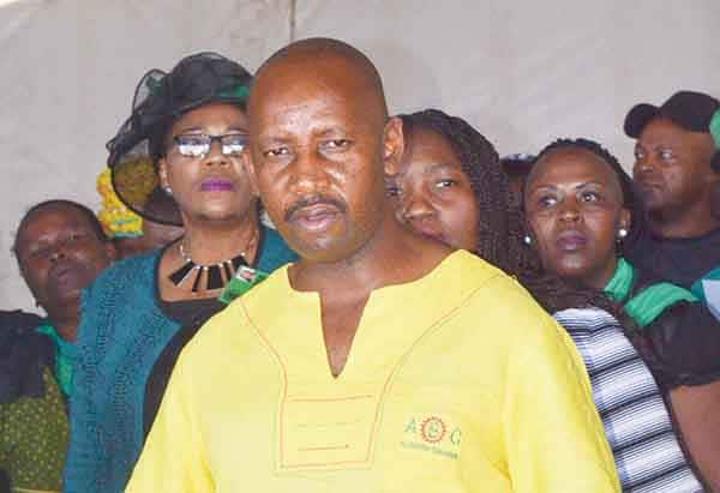Africa-Press – Lesotho. A faction of the divided All Basotho Convention (ABC) this week launched an assault on an Appeal Court order that allowed its rivals to contest last February’s disputed internal party polls, as it ratcheted up pressure on its reeling opponents.
The old National Executive Committee (NEC) – dubbed the Thabane faction by the media – wants the Appeal Court to review and set aside its decision that ousted clause 5 (e) of the party’s constitution.
In court papers filed on Wednesday, the ABC has asked the Appeal Court to review its February declaration of the clause ultra vires the country’s constitution – the supreme law of the land.
The Apex Court in February nullified clause 5 (e) of the ABC constitution, ruling that it contravened section 26 of the Lesotho Constitution which guarantees citizens’ rights to equality and justice.
The February ruling was precipitated by the ABC Koro Constituency’s appeal of a judgment by Acting Chief Justice ’Maseforo Mahase, dismissing the constituency’s petition that the court cancels and sets aside NEC’s decision to disqualify embattled deputy leader, Professor Nqosa from contesting the party’s NEC elections.
The constituency, in its prayers, also challenged the constitutionality of clause 5 (e) of the ABC constitution. According to the clause, party members who sue the ABC automatically expel themselves from the party but Koro Koro constituents who were backing Mahao challenged the constitutionality of the clause.
Justices Kananelo Mosito, Moses Chinengo and Petros Damaseb agreed with the Koro Koro constituency. The party’s old NEC now wants the court to review its decision on the impugned clause in the second of two cases it has mounted this week following last week’s order by Justice Mahase, nullifying the ABC elective conference at which Prof Mahao was elected.
The order which has drawn sustained criticism from Mahao’s camp and some members of the legal fraternity also declared the old NEC the interim NEC for a year.
Now smelling blood after last week’s court victory, the interim NEC is today (Friday) expected to ask the High Court to bar Mahao and his colleagues from holding rallies under the aegis of the ABC. The interim NEC also wants the court to compel the police to stop issuing permits to the Mahao camp to host rallies under the banner of the ABC.
The interim NEC secretary general, Samonyane Ntsekele, is the applicant in both cases while Mahao, his faction’s chairperson Samuel Rapapa, secretary general Lebohang Hlaele, spokesperson Montoeli Masoetsa, deputy spokesperson ’Matebatso Doti, Commissioner of Police Holomo Molibeli, minister of police Tefo Mapesela, minister of local government and Attorney General Haae Phoofolo are respondents.
In the clause 5 case, Ntsekele is arguing that the court made two different decisions on the same matter and should thereby review its decision. It is also ABC’s case that the Apex Court was not entitled to assume that the constitutionality or otherwise of clause 5 (e) of the ABC constitution was or was not presented before the High Court exercising its constitutional jurisdiction for determination as it had directed in its earlier decision.
The Koro Koro constituency’s appeal was before the Apex Court in two separate instances, both challenging the constitutionality of clause 5. In the first instance, the court upheld a point that the constitutionality of the clause can only be decided by the High Court sitting as the Constitutional Court.
In the second instance, the court declared the clause unconstitutional. According to Ntsekele, the Appeal Court ought not to have decided on the issue that was raised for the first time at the appeal stage.
He said the issue died when the Appeal Court in the first instance upheld the High Court decision to the effect that the proper court to determine the issue was the Constitutional Court.
“As a matter of emphasis, I respectfully submit that it was fundamentally irregular for this Honourable Court to entertain the issue when it re-surfaced during the second appeal, without the issue having been heard and determined by the High Court exercising its constitutional jurisdiction,” he said.
Ntsekele contends that in entertaining the second appeal, the court had denied the ABC access to a judicial process which entails the right of access to the court of first instance and to have a dispute determined by that court before being deliberated by the appellate court.
“I am cognisant of the provisions of section 129 (1) (b) of the Constitution of Lesotho which provide that an appeal shall lie as of right to the Court of Appeal from the final decisions of the High Court under section 22 of the constitution.
“In the present matter, the High Court made no final decision on the constitutional validity or otherwise of clause 5 (e) of the ABC constitution,” he adds.
He further states that: “I have to uncomfortably submit that the highest court in the land impinged on section 129 (1 (b) of the Constitution of Lesotho in entertaining an appeal on an issue that the High Court has not given a final decision, let alone even considered (the issue).
While he contends the court has the authority to raise an issue mero motu (out of accord) for the first time at appeal, Ntsekele says there is nothing from the Appeal Court judgment to suggest that the court had done so and thereby asked the court to review its decision.
“In the circumstances, I humbly submit that this is one of those befitting exceptional situations where the court has inherent power to revisit its decision and even set it aside due to the manifest and grave injustice that would otherwise occur.
Narrating the events leading to the Apex court decision, Ntsekele explains that his party had raised a point of law in the High Court, arguing that the court in its ordinary sitting did not have jurisdiction to entertain the matter but rather that the High Court should sit as a Constitutional Court to determine the constitutionality of the contentious clause.
He further alleges that the High Court did not entertain the merits of the application, including the constitutionality of the clause. Ntsekele says the Koro Koro constituency then noted an appeal against the High Court judgment and that one of their appeals was that the High Court erred in holding that it did not have the jurisdiction to decide on the constitutionality of the impugned clause.
“Whilst this Honourable Court upheld the appeal and remitted the matter back to the High Court for consideration on the merits, it however dismissed the ground of appeal relating to the constitutional validity of clause 5 (e) of the ABC constitution.
“In other words, this court found that it was correct for the High Court sitting as it was in its ordinary jurisdiction, to have declined to entertain the issue regarding the constitutional validity or otherwise of Clause 5 (e) of the ABC constitution.
Ntsekele further states: “In its judgment and with reference to its earlier judgments, this Honorable Court discussed in great detail the ordinary jurisdiction of the High Court and the jurisdiction of the High Court sitting as Constitutional Court.
“As a result of the Honorable Court’s judgment in this regard, the constitutional validity of clause 5 (e) of the ABC constitution was no longer an issue for determination when the matter was remitted back to the High Court.
He has also argued that given a chance before a proper court, the ABC would argue that Clause 5 (e) is not unconstitutional as had been alleged by the Koro Koro constituency.
“I submit that the impugned clause does not infringe upon the Constitution of Lesotho and in particular, does not deny members access to the courts of law.
“On the contrary, the clause simply recognises internal remedies for resolving disputes provided for by the ABC constitution and requires of the members to exhaust such remedies before resorting to the courts of law.
“I submit that such a clause is common in most social institutions; it be in political parties, private companies and even in government.
Ntsekele says the intention of the clause was never to deny those it regulates access to the courts of law but to encourage members to exhaust internal dispute resolution mechanisms before exercising their rights before the courts of law.
He also maintains that his party is ready to argue the matter before the Constitutional Court but that there has not been a constitutional challenge to the clause up to this far.
“As already stated, clause 5 (e) of the ABC Constitution has to date not been subjected to a constitutional challenge before the High Court exercising its constitutional jurisdiction.
“By raising the constitutional validity of clause 5 (e) as a ground of appeal, without the issue having first been deliberated by the High Court exercising its constitutional jurisdiction, the respondents herein willfully misdirected this Honorable Court into assuming that the issue was argued and decided in the court a quo,” Ntsekele adds.
Mahao contested and won the deputy leader’s post at the ABC’s elective conference despite vehement opposition from the Thabane faction which has since tied them in court challenging their eligibility and legality of the polls at which they were elected.
Three ABC legislators, Habofanoe Lehana (Khafung), Keketso Sello (Hlotse) and Mohapi Mohapinyane (Rothe) filed a court application on February 11, seeking an order to nullify the outcome of the conference, arguing the polls were marred by “vote rigging.
Despite postponing the case on several occasions, Justice Mahase shocked the Mahao faction last Wednesday when she delivered judgment in a separate but similar application that was brought before her by ABC members, Motseki Lefera, ’Matumisang Ntiisa and Martha Makhohlisa.
For More News And Analysis About Lesotho Follow Africa-Press






